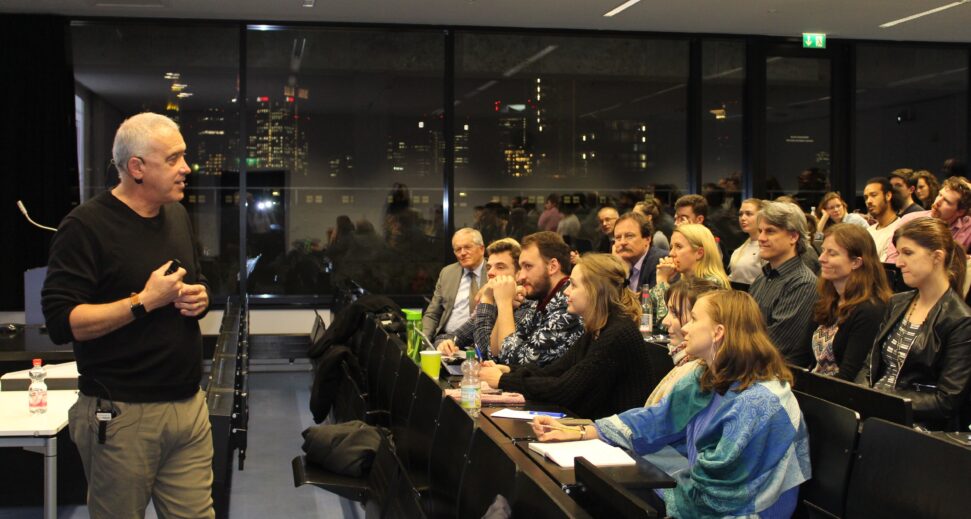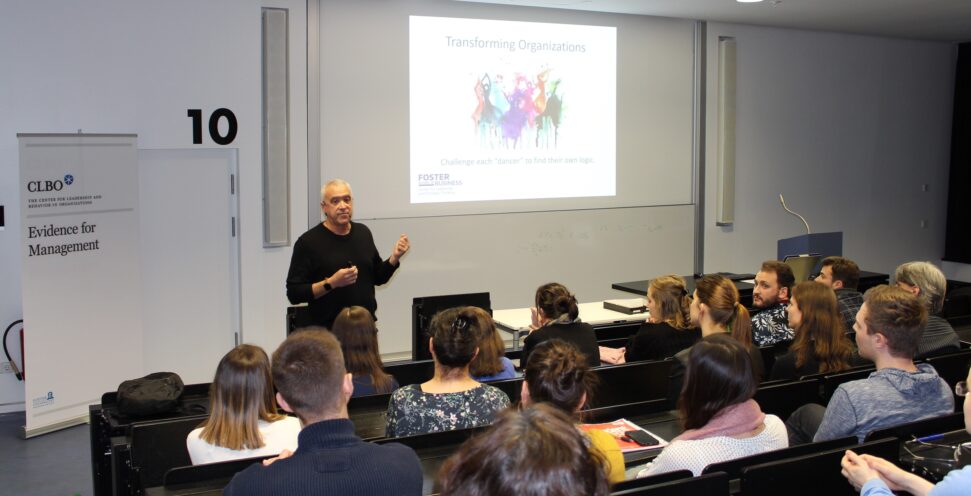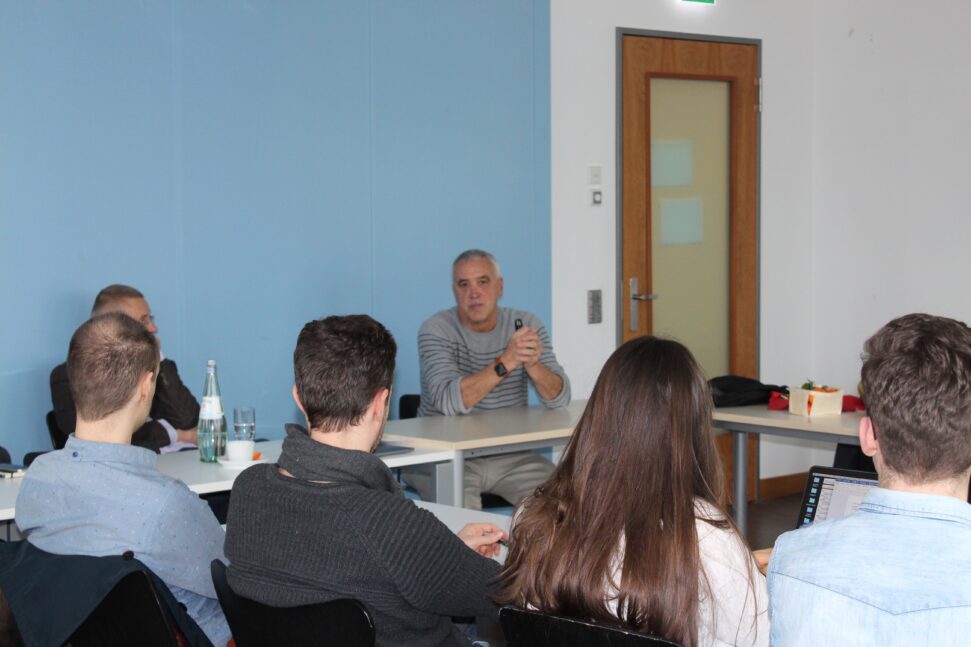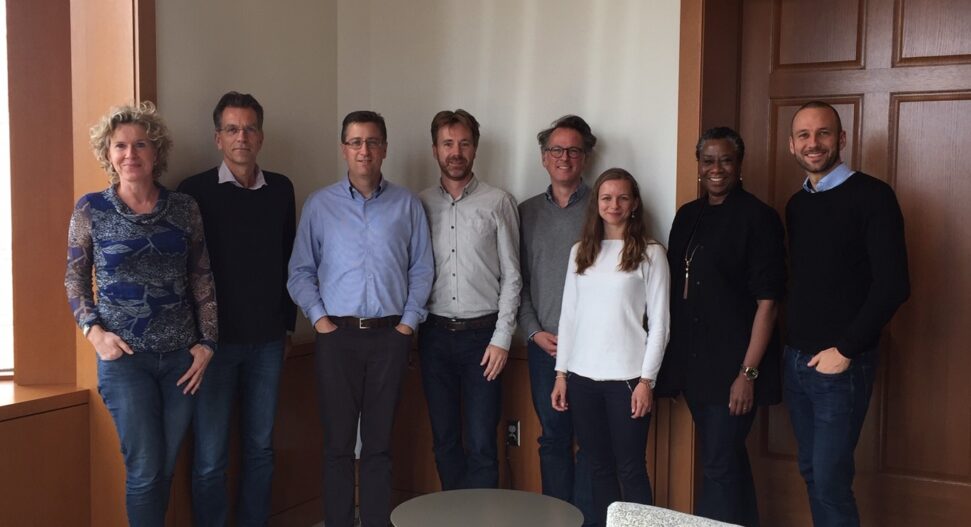News & Events
News & Events – page 3
February 19th, 2020 Visit and talk from Prof. Bruce Avolio
 Prof. Dr. Bruce Avolio, regarded as one of the world’s leading experts in the field of leadership, has visited the Center for Leadership and Behavior in Organizations (CLBO) in February 2020. He is one of the most cited researchers in industrial and organizational psychology. He is best known for his work on transformational leadership, but has also done research on other topics. During his stay, he held a lecture for scientists and practitioners titled “Understanding the First Principle for Successful Organizational Transformation: Change Occurs One Person at a Time”. In the lecture, he explained principles of organizational change and applied them to actual examples of real life organizations. This talk was well visited by many interested people who asked questions and discussed various topics with him. Bruce Avolio also took part in a CLBO Small Group Meeting in which he gave another talk on “Authentic Leadership, Employee Voice and Organizational Sustainability”. In addition, he had many personal meetings with PhD students, research associates and professors to discuss and give feedback on current research projects.
Prof. Dr. Bruce Avolio, regarded as one of the world’s leading experts in the field of leadership, has visited the Center for Leadership and Behavior in Organizations (CLBO) in February 2020. He is one of the most cited researchers in industrial and organizational psychology. He is best known for his work on transformational leadership, but has also done research on other topics. During his stay, he held a lecture for scientists and practitioners titled “Understanding the First Principle for Successful Organizational Transformation: Change Occurs One Person at a Time”. In the lecture, he explained principles of organizational change and applied them to actual examples of real life organizations. This talk was well visited by many interested people who asked questions and discussed various topics with him. Bruce Avolio also took part in a CLBO Small Group Meeting in which he gave another talk on “Authentic Leadership, Employee Voice and Organizational Sustainability”. In addition, he had many personal meetings with PhD students, research associates and professors to discuss and give feedback on current research projects.



January 4th, 2020 Lecture: Understanding the First Principle for Successful Organizational Transformation: Change Occurs One Person at a Time
Understanding the First Principle for
Successful Organizational Transformation:
Change Occurs One Person at a Time
Prof. Bruce J. Avolio
The CLBO Leadership Lectures
Tuesday, 18th February 2020,
at Goethe University Frankfurt, Campus Westend, Lecture Hall (Hörsaal) HZ 10, 18.30h – 20.00h,
followed by a reception
To the degree the horizon for when the leaders of an organization perceive the need for their organization to change is longer then the time horizon dictated by their competitors, the probability of being able to change and sustain success is substantially reduced. It is therefore incumbent upon organizational leaders to match the evolution of change occurring in their external markets by promoting a continuous readiness for transformation. We begin our examination of organizational transformation with an assumption that all organizational leaders must remain vigilant to the ongoing need to evolve and transform, not when platforms are burning, but when they are just contemplating how to create those platforms. We also make a distinction between change efforts and transformation, with the latter representing fundamental change in how organizational members identify with and construe their roles in achieving and sustaining success in their organization. The ultimate goal for this presentation is to demonstrate the first principle of organizational transformation. Specifically, all employees must fundamentally alter how they each conceive of their organization, in order for their organization to achieve and sustain a successful transformation. We examined in a series of studies the 4 states that organizations navigate through to transform, and the key mechanisms comprising those states that promote a successful organizational transformation. Specific examples of how leaders have successfully navigated through change to transform their organization will be discussed and applied to the challenges facing attendee’s organizations.
Prof. Bruce J. Avolio was has published 12 books and over 150 articles on leadership and related areas. In 2018, Bruce was recognized as being among the top 70 most highly cited researchers in the United States in Economics and Business, and among the top 3,000 across all sciences around the globe (Thompson Reuters). He was listed this past year at the #18th spot on the all time most highly cited industrial and organizational psychology researchers over the last 100 years.
This event is organized by the Center for Leadership and Behavior in Organization in the new annual Leadership Lectures series.
Participation in the event and following reception is free of charge. For registration, please send an email to a.kaluza@clbo-frankfurt.org. Registration deadline is February 7th, 2020.
November 27th, 2019 Global Leadership Center Roundtable in St. Louis
On November 6 & 7, 2019 the second annual meeting of the Global Leadership Center Roundtable took place at Washington University in St. Louis (MO). Stuart Bunderson and Marcianne Gagliardi from the Bauer Leadership Center at Olin Business School were the organizers of this year’s meeting that brought together the following participants:
• Janka Stoker and Harry Garretsen from the leadership center In the LEAD at the University of Groningen
• Ben Kuipers from the Leiden Leadership Centre
• Christian Bøtcher Jacobsen from the Crown Prince Frederik Center for Public Leadership at the University of Aarhus
• Eva Bracht and Michael Kosfeld from the Center for Leadership and Behavior in Organizations (CLBO) at Goethe University Frankfurt
• Vyla Rollins from the Leadership Institute at London Business School
• Stuart Bunderson and Marcianne Gagliardi from the Bauer Leadership Center at Olin Business School, Washington University in St. Louis
The Global Leadership Center Roundtable is a new initiative that started with the first meeting at the University of Groningen last year. Its objective is to foster interaction between research-driven leadership centers in the world and benefit from the exchange of experiences and best practices at the different centers. This year – besides the discussion of exciting new research – the focus was on different “theories and models of leadership” that are used at the different centers. The next meeting is going to take place in November 2020 at the Crown Prince Frederik Center for Public Leadership in Aarhus.

From left to right: J. Stoker, H. Garretsen, S. Bunderson, B. Kuipers, M. Kosfeld, E. Bracht, V. Rollins, C. Jacobsen
November 21st, 2019 Study about the German police force
A new study explores the trustworthiness of applicants to the German police force. Here you can find a report about the article.
Nicht nur in der Forschung, sondern auch in der Praxis rückte die Führungskräftegesundheit vermehrt in den Fokus. In einer kürzlich veröffentlichten Meta-Analyse haben Antonia Kaluza und Rolf van Dick von der Goethe Universität Frankfurt zusammen mit Wissenschaftlerinnen der Christian-Albrechts-Universität zu Kiel und der Universität Koblenz-Landau die bisherigen Erkenntnisse dieses noch recht jungen Forschungsfeldes theoretisch und empirisch zusammengefasst. In einem Interview im Uni-Report beantwortet Antonia Kaluza Fragen zu der Studie. Das Interview finden Sie hier.
Antonia J. Kaluza, Diana Boer, Claudia Buengeler & Rolf van Dick (2019). Leadership behaviour and leader self-reported well-being: A review, integration and meta-analytic examination, Work & Stress. DOI: 10.1080/02678373.2019.1617369
Angestoßen durch das Urteil des Europäischen Gerichtshofs am 14. Mai 2019, nach dem Arbeitgeber verpflichtet sind, die gesamte Arbeitszeit ihrer Beschäftigten systematisch zu erfassen, führten wir im Mai und Juni 2019 eine Befragung durch. Der Fragebogen wurde online von 864 Teilnehmern beantwortet, darunter Beschäftigte aus Firmen ganz unterschiedlicher Branchen sowie Behörden und andere Organisationen. Unter den Befragten waren 62% Männer, 46% haben Führungsverantwortung und das Alter bildet nahezu einen Querschnitt der sozialversicherungspflichtig Beschäftigten in Deutschland ab.
Das sind die Kernergebnisse:
1. Die Befragten verteilen sich auf zwei große Pole. Die Hälfte erfasst ihre Arbeitszeit nicht, hat also Vertrauensarbeitszeit während ein Drittel die gesamte Arbeitszeit erfasst – egal wann und wo diese erbracht wird.
2. Beide Gruppen „verteidigen“ ihr jeweiliges Modell. Von denjenigen, die in Vertrauensarbeitszeit beschäftigt sind, möchte nur eine Minderheit, dass die Arbeitszeit erfasst wird. Umgekehrt wünschen sich zwei Drittel der Befragten mit Vollerfassung diese auch für die Zukunft.
3. Männer haben häufiger Vertrauensarbeitszeit als Frauen und sind auch etwas zufriedener als Frauen mit der Art der Erfassung. Männer haben auch häufiger Führungsverantwortung. Wenn man aber den Effekt der Führung herausrechnet, bleibt ein Geschlechtseffekt zugunsten größerer Zufriedenheit der Männer mit der Erfassung bestehen.
4. Gefahr der (Selbst-)Ausbeutung ist präsent. Von den Befragten mit Vollzeit–erfassung möchten nur wenige auf Vertrauensarbeitszeit „umsteigen“ – hier werden wohl eher negative Effekte im Sinne von (Selbst-)Ausbeutung erwartet. Überraschend: Dies gilt insbesondere für Frauen, die sich keine stärkere Flexibilisierung wünschen, um Beruf und Familie vereinbaren zu können.
5. Allgemeine Arbeitszufriedenheit hat positiven Einfluss. Die Zufriedenheit mit der Erfassung bzw. der Vertrauensarbeitszeit hängt generell zusammen mit der Zufriedenheit und Identifikation mit dem Unternehmen.
Unser Fazit: Das Thema polarisiert. Zugleich scheint die Bereitschaft zur Veränderung gering – egal für welches neue Konzept zur Erfassung der Arbeitszeit. Ein bestimmtes Modell wird weder der Realität noch den Wünschen und Erwartungen gerecht. Unternehmen sollten - gestützt auf Daten (z.B. eigene Umfragen) - passgenaue Lösungen entwickeln.
Die vollständigen Ergebnisse können Sie hier kostenlos herunterladen.
